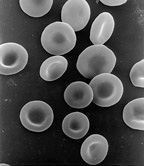
Photo from wikipedia
The hematological module of the Athlete Biological Passport (ABP) represents an important tool in the pursuit to detect blood doping in athletes. Currently, collecting blood samples for ABP analysis can… Click to show full abstract
The hematological module of the Athlete Biological Passport (ABP) represents an important tool in the pursuit to detect blood doping in athletes. Currently, collecting blood samples for ABP analysis can be cumbersome, invasive, and expensive; involving a venous blood draw performed by a trained phlebotomist followed by cold chain monitored shipping to the analysis laboratory. Developing innovative methods to collect and transport ABP blood samples while adhering to strict pre-analytical and analytical requirements has the potential to greatly increase testing frequency, and consequently, the effectiveness of the ABP program globally. The focus of this study was to compare venous blood collections with capillary blood collections to determine if capillary samples could be used for ABP analysis without sacrificing the analytical integrity required for anti-doping testing procedures. In this study, capillary blood was collected using the Tasso+ EDTA device (Tasso, Inc.), a novel micro-volumetric device that collects liquid, whole blood from skin capillaries on the upper arm. Excellent laboratory agreement was observed between venous and capillary blood samples for the three main ABP parameters: HGB, RET%, and OFF-Score. Additionally, the stability of capillary samples after storage at 4°C, similar to what would be required during transport, was acceptable for up to 72 hours following collection. Finally, we generated individual ABP profiles using the Adaptive model for ten participants and observed excellent agreement between venous and capillary profiles. These results indicate capillary blood collection is a viable alternative to venous blood collections for ABP analysis.
Journal Title: Drug testing and analysis
Year Published: 2022
Link to full text (if available)
Share on Social Media: Sign Up to like & get
recommendations!